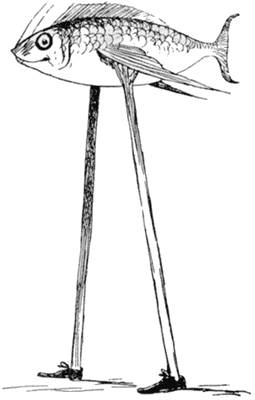| Wir sind die Fische, Wir mögen auch beißen... |
We are the fishes, We can bite, too! |
| Стала петь мышонку щука — Не услышал он ни звука: Разевает щука рот, А не слышно, что поёт... Глупый маленький мышонок Отвечает ей спросонок: - Hет, твой голос нехорош. Слишком тихо ты поешь! |
Mrs. Fish's mouth is round, But it doesn't make a sound: Though she moves her lips to sing Still the mouse can't hear a thing... Says the sleepy little mousey Barely opening an eye, "No, your voice is way too quiet! I don't like your lullaby."1 |
Fisches Nachtgesang
—
⌣ ⌣
— — — ⌣ ⌣ ⌣ ⌣ — — — ⌣ ⌣ ⌣ ⌣ — — — ⌣ ⌣ ⌣ ⌣ — — — ⌣ ⌣ ⌣ ⌣ — — — ⌣ ⌣ — |
Fish's Night Song
(translated by Max Knight)
—
⌢ ⌢
— — — ⌢ ⌢ ⌢ ⌢ — — — ⌢ ⌢ ⌢ ⌢ — — — ⌢ ⌢ ⌢ ⌢ — — — ⌢ ⌢ ⌢ ⌢ — — — ⌢ ⌢ — |
 |
| A picture which is not a frame from March of the Fishes. |
Cage's piece, fittingly, is used as the soundtrack for the upcoming documentary March of the Fishes, narrated by David Attenborough in absentia.
1Of course I can't resist commenting on the translation process here. The fish in the original poem is a pike, a common character of Russian folklore but one you can't expect American children, say, to know. Its predatory reputation helps pave the way for the cat that ends the poem. To preserve that, it could become a shark, but sharks and mice don't really live anywhere near each other... In the end, better to stick with a generic fish with a round, lippy mouth, which happens to be what I could most easily fit into the meter and rhyme scheme.

No comments:
Post a Comment